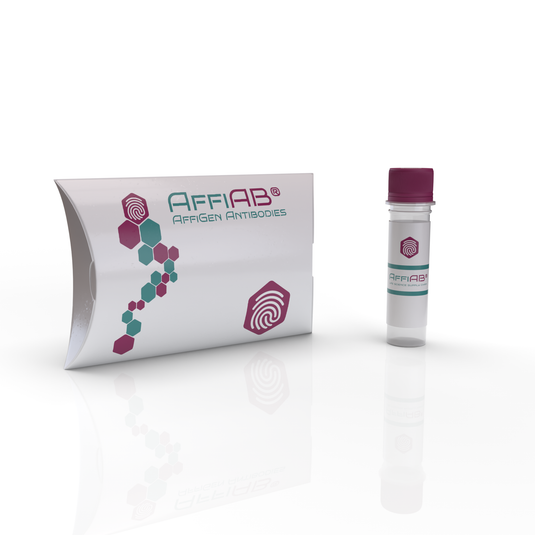AffiAB® Goat Anti-Hsl1 Polyclonal IgG Antibody
Our AffiAB® Goat Anti-Hsl1 Polyclonal IgG Antibody is an IgG antibody designed to recognize Helix-loop-helix transcription factors specifically expressed in mouse brain. This antibody offers high specificity and sensitivity and is an excellent tool for Western blot and ELISA assays.
Host: Goat
Species: Ustilago maydis
Description: The AffiAB® Goat Anti-Hsl1 Polyclonal IgG Antibody is a high-quality research tool used for the detection and analysis of the Hsl1 protein in various biological samples. Hsl1 (histone H1-like protein) is a serine/threonine protein kinase that plays an important role in regulating cell cycle progression and cytokinesis in yeast and other eukaryotic cells. This antibody has been developed using purified Hsl1 protein as the immunogen and has been affinity-purified to ensure high specificity and sensitivity. It can be used for Western blotting, immunoprecipitation, and immunofluorescence studies in a variety of research applications. The AffiAB® Goat Anti-Hsl1 Polyclonal IgG Antibody is supplied in a convenient 50 µl size and is suitable for use in both basic and applied research settings.
Gene Identifier/Accession Number: N/A
Form: N/A
Concentration: 2.5 mg/mL
Type: Primary
Clonality: Polyclonal
Isotype: IgG
Conjugation: Unconjugated
Application: Western Blot
Storage: For continuous use, store at 2-8 C for one-two days. For extended storage, store in -20 C freezer. Working dilution samples should be discarded if not used within 12 hours.
Special instructions: The antibody solution should be gently mixed before use.
Goat Anti-Hsl1 Polyclonal IgG Antibody
Cellular processes are orchestrated by a multitude of proteins, each with its unique role in maintaining the delicate balance of life. HSL1 (Homolog of Saccharomyces cerevisiae Long) is a protein involved in cell cycle regulation and is crucial for maintaining genome stability. Researchers seeking to delve deeper into the intricacies of HSL1-mediated cellular functions have a powerful ally in the Anti-HSL1 Polyclonal IgG Antibody. This versatile research tool facilitates investigations into the roles and implications of HSL1 in cellular processes and disease.
Unraveling the Significance of HSL1
HSL1 is a conserved protein found in various organisms, including yeast and humans. Its primary role is in cell cycle regulation, specifically in the control of the G2/M transition. HSL1 acts as a kinase, phosphorylating target proteins to coordinate cell division. Dysregulation of HSL1 can lead to aberrant cell cycle progression and genome instability, which are associated with various diseases, including cancer.
Anti-HSL1 Polyclonal IgG Antibody: An Overview
The Anti-HSL1 Polyclonal IgG Antibody is specifically designed to target HSL1 proteins. This antibody is generated by immunizing animals (typically rabbits or goats) with purified HSL1 protein, resulting in a polyclonal mixture of immunoglobulins G (IgG) capable of recognizing multiple epitopes on the HSL1 molecule. Its polyclonal nature enhances its versatility, making it an invaluable asset for a wide range of experimental applications.
Applications of Anti-HSL1 Polyclonal IgG Antibody
Western Blotting:
Researchers employ this antibody in Western blot assays to quantify HSL1 protein levels in cell lysates or tissue extracts. This application is instrumental for studying changes in HSL1 expression and post-translational modifications under various experimental conditions.
Immunoprecipitation (IP):
The antibody is used in IP assays to isolate HSL1-associated protein complexes, shedding light on its interactions with other molecules and its involvement in specific cellular processes.
Immunofluorescence (IF) and Immunohistochemistry (IHC):
Scientists utilize this antibody in IF and IHC experiments to visualize the subcellular localization of HSL1 within cells and tissues. These techniques enable the assessment of changes in HSL1 distribution under different biological contexts.
Functional Studies:
The Anti-HSL1 Polyclonal IgG Antibody can be applied in functional assays to investigate the impact of HSL1 modulation on cell cycle regulation, genome stability, and cellular homeostasis, providing crucial insights into its roles in cell biology.
Disease Research:
Dysregulation of HSL1 has been linked to diseases characterized by aberrant cell cycle progression and genome instability. Researchers use this antibody to explore the underlying mechanisms and potential therapeutic targets associated with HSL1-related pathologies.
Conclusion
The Anti-HSL1 Polyclonal IgG Antibody serves as an invaluable tool in cell biology and cellular regulation research. Its specificity, versatility, and reliability make it an indispensable asset for investigating the functions of HSL1 in cellular processes and understanding its implications in health and disease. As scientists continue to explore the intricate pathways of cell cycle regulation and genome stability, this antibody remains a trusted companion in their quest for knowledge and advancements in cellular research and beyond.

